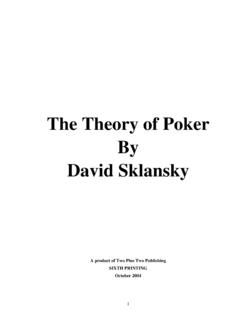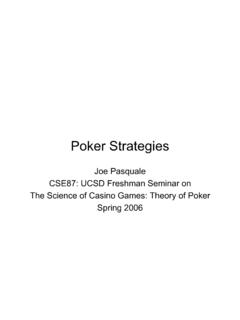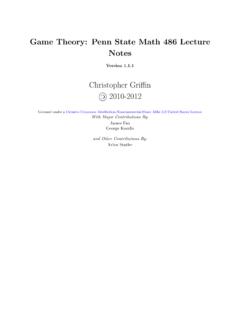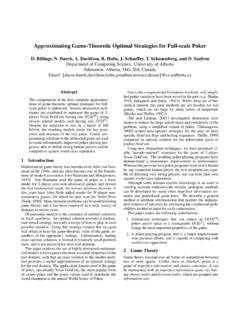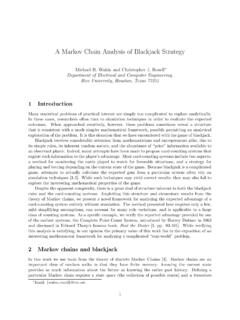Transcription of PROBABILITY GUIDE TO GAMBLING - Probability Theory Guide
1 PROBABILITY GUIDE TO GAMBLING The Mathematics of Dice, Slots, Roulette, Baccarat, Blackjack, Poker, Lottery and Sport Bets C t lin B rboianu INFAROM Publishing Applied Mathematics ISBN-10 9738752027 ISBN-13 9789738752023 Publisher: INFAROM Author and translator: C t lin B rboianu Correction Editor: Sara M. Stohl Copyright INFAROM 2009 This work is subject to copyright. All rights are reserved, whether the whole or part of the material is concerned, specifically the rights of translation, reprinting, reuse of tables, recitation, broadcasting, reproduction on microfilm or in any other way, and storage in data banks.
2 Duplication of this publication or parts thereof is permitted only under the provisions of Copyright Laws and permission for use must always be obtained from INFAROM. CONTENTS (of the complete edition) Introduction .. 5 PROBABILITY Theory Basics .. 15 Fundamental notions .. 16 Sets .. 16 Functions .. 18 Boole algebras .. 20 Sequences of real numbers. Limit .. 22 Series of real numbers .. 28 Measure Theory basics .. 29 Sequences of sets .. 30 Tribes. Borel sets. Measurable space.
3 31 Measure .. 34 Field of events. PROBABILITY .. 37 Field of events .. 39 PROBABILITY on a finite field of events .. 45 Properties of PROBABILITY .. 48 PROBABILITY -field .. 54 Independent events. Conditional PROBABILITY .. 56 Total PROBABILITY formula. Bayes s theorem .. 58 Law of large numbers .. 59 Discrete random variables .. 61 Distribution function .. 64 Classical discrete PROBABILITY distributions .. 65 Bernoulli scheme.
4 65 Poisson scheme .. 67 Polynomial scheme .. 69 Scheme of nonreturned ball .. 70 Convergence of sequences of random variables .. 71 Law of large numbers .. 72 Combinatorics .. 75 Permutations .. 75 Arrangements .. 76 Combinations .. 77 The Mathematics of Games of Chance .. 79 Experiments, events, PROBABILITY fields .. 80 PROBABILITY calculus .. 88 Properties of PROBABILITY .. 88 Odds and PROBABILITY .. 91 Combinations.
5 92 Expectation .. 93 Relative frequency. Law of Large Numbers .. 96 Relativity of PROBABILITY results .. 100 The GUIDE of Numerical Results .. 105 Dice .. 106 Two dice .. 106 Three dice .. 109 Slots .. 111 Three reels .. 111 Four reels .. 112 Roulette .. 118 Simple bets .. 121 Complex bets .. 124 Equivalent bets .. 127 Betting on a colour and on numbers of the opposite colour .. 129 The martingale .. 147 Baccarat .. 151 Blackjack.
6 181 Classical Poker .. 201 Initial probabilities on the first card distribution for your own hand .. 205 Prediction probabilities after the first card distribution and before the second for your own hand .. 214 Prediction probabilities for opponents hands .. 239 Odds of holding three of a kind or better .. 241 Texas Hold em Poker .. 248 Immediate odds .. 252 Preflop odds .. 252 Flop odds .. 262 Turn odds .. 274 Other odds .. 275 Opponents hands probabilities.
7 279 Lottery .. 280 General formula of the winning PROBABILITY .. 283 Cumulated winning probabilities .. 297 Enhancing the winning PROBABILITY .. 299 Sport Bets .. 304 The PROBABILITY -based Strategy .. 311 References .. 329 Introduction PROBABILITY Theory is a formal Theory of mathematics like many others, but none of them raised so many questions about its interpretations and applicability in daily life as this Theory does. Even though many of these questions have found no satisfactory answer yet, PROBABILITY still remains the only Theory that models hazards through mathematical methods, even if it operates on a minute part of what a hazard would mean.
8 Owing to its psychological impact on human concerns in daily life, PROBABILITY Theory has gained considerable popularity among ordinary people, regardless of whether they have a mathematical background. Moreover, people refer to PROBABILITY and statistics anytime they need additional information about the occurrence of an event. Laymen and scientists alike are fascinated by PROBABILITY Theory because it has multiple models in nature, it is a calculus tool for other sciences and the PROBABILITY concept has major philosophical implications as well. But no matter how paradoxically it may look, the popularity of PROBABILITY Theory is not that beneficial for average people.
9 The relativities of the term PROBABILITY , even if related only to the mathematical definition, may introduce a lot of errors into the qualitative and quantitative interpretation of PROBABILITY , especially as a degree of belief. These interpretation errors, as well as that false certainty psychologically introduced by the numerical result of measuring an event, turn PROBABILITY calculus into a somewhat dangerous tool in the hands of persons having little or no elementary mathematical background. This affirmation is not at all hazardous, because probabilities are frequently the basis of decisions in everyday life.
10 Due to a natural need that is more or less rigorously justified, humans consistently refer to statistics; therefore, PROBABILITY has become a real decision-making tool. Here is an example otherwise unwanted of making a decision based on PROBABILITY is the following: Your doctor communicates the stages of evolution of your disease: if you won t have an operation, you have a 70 percent chance of living, and if you ll have the operation, you have a 90 percent chance of a cure, but there is a 20 percent chance that you will die during the operation. Thus, you are in a moment when you have to make a decision, based on personal criteria and also on communicated figures (their estimation was performed by the doctor according to statistics).

